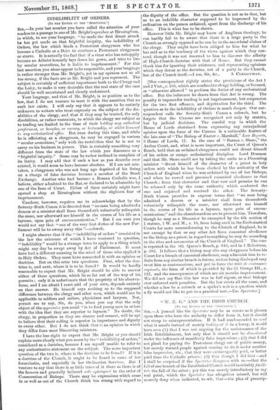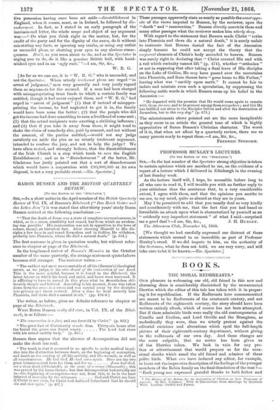" W. R. 0." AND THE IRISH CHURCH.
[To THE. EIHTOH OF THE "SPECTATOR:] Sfn,—A journal like the Spectator may be as severe as it pleases upon those who have the audacity to differ from it, but it should not stoop to misrepresentation. If it had condescended to read what it assails instead of merely looking at it in a hurry, it would have seen (1) that I was not arguing for the maintenance of the Irish Establishment, but only that it should not be disendowed under the influence of manifestly false impressions ; (2) that I did not plead for paying the Protestant clergy out of public money, but merely warned people against ceasing to do it under another false impression, viz., that they were extravagantly paid, or better paid than the Catholic priests ; (3) that though I did hint—and I shall be surprised if the Spectator disagrees with me—that the fall of one branch of the Established Church would inevitablyfacili- tate the fall of the other ; yet this was merely introductory to my real point, which the Spectator has altogether missed, but will scarcely deny when indicated, to wit, that—the plea of prescrip- tive pbssession having once been set aside—disestablishment 'in England, when it comes, must, as in Ireland, be followed by dis- endowment. In fact, as I stated in an early paragraph of the incriminated letter, the whole scope and object of my argument was :—" Do what you think right in the matter, but, for the credit of the party and for the dignity of the came, do it without mis-stating any facts, or ignoring any truths, or using any unfair or uncandid pleas, or shutting your eyes to any obvious conse- quences. Don't, as you seem about to do, and as the Spectator is urging you to do, do it like a genuine British bull, with hood- winked eyes and in an ugly rush.' "—I am, Sir, &c.,
W. R. G.
[As far as we can see, it is " W. R. G." who is uncandid, and not the Spectator. When utterly irrelevant pleas are urged "in arrest of judgment," men very generally and very justly regard them as arguments for the accused. If a man had been charged with misappropriating trust funds to which a certain family was entitled, though it had never enjoyed them, and "`V. R. G." had urged in "arrest of judgment" (1) that if instead of misappro- priating the income, be had neglected to get it in, the family would have been none the better ; (2) that the people who did get the income had done something to earn a livelihood of some sort ; (3) that the actual recipients were exerting a civilizing influence ; and (4) that if you take it away from them, it might tend to shake the claim of somebody else, paid by consent, and not without the consent, of the parties entitled,—would not any judge cavalierly set aside the plea as an utterly irrelevant argument, intended to confuse the jury, and not to help the judge? We have often stated, and strongly believe, that the disestablishment of the Irish Church is a step which tends to save the English Establishment ; and as to " disendowment " of the latter, Mr. Gladstone has justly pointed out that a sort of disendowment which would leave a corporation with £90,000,000 at its own disposal, is not a very probable event.—En. Spectator.]







































 Previous page
Previous page